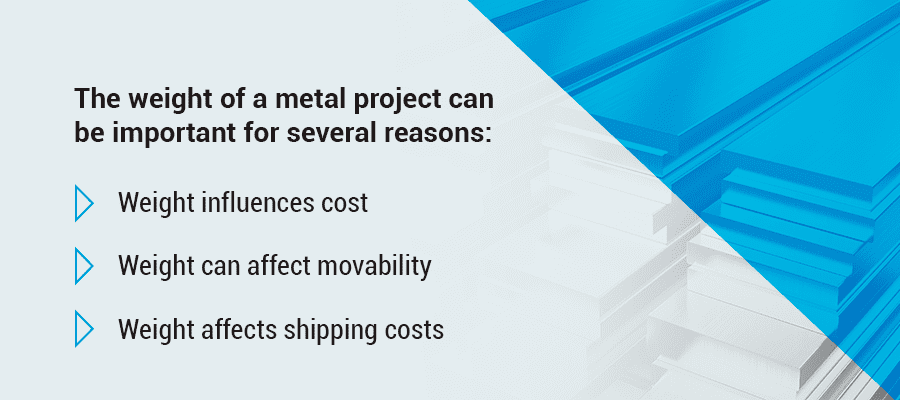
When choosing a material for your metal project, you want one that suits your budget, performs well and looks good. This means you must consider several factors, including the material’s strength, corrosion resistance and malleability.
One of the most important considerations is the weight of the metal, as it affects numerous factors — from cost to movability. Below, you’ll learn how to calculate the weight of your metal project based on the type and amount of metal you intend to use.
Calculating the weight of your metal project is quite simple and involves just four steps:
The first thing you want to do is determine the area of a cross-section of the metal product. You can accomplish this by multiplying the width of the cross-section by its height. The area should be in square millimeters (mm2), as you will see in a formula later in this article.
Next, determine the length of your metal product, which should be in meters (m).
The third measurement you must determine is your product’s density, which is its mass per unit of volume. For instance, if a material has a density of 7.5 g/cm3, this means that, in every cubic centimeter of the material, there are 7.5 grams of mass.To determine the density of the metal you’re considering, you’ll have to refer to a density table. In this table, you’ll notice some metals come in various grades, each of which has a different density. For example, the density of stainless steel ranges from 7.7 to 8 g/cm3, depending on the grade.
Once you have the measurements for the sectional area, length, and density of your material, you can now calculate metal weight using the following calculation formula:
To obtain the weight of your metal, you will multiply the sectional area, length and density together. Then, to convert the weight to kilograms, you must divide the product by 1,000.
You can also determine the weight of your metal product using any number of online metal weight calculators. You can input the dimensions and metal type, and the calculator will compute the estimated weight of your metal product.

When choosing the right metal for your project, weight is an important consideration, but there are also many other factors you must consider, including hardness, strength and corrosion resistance.
To match customers’ visions for the equipment, tools or structures they need, metal fabrication companies generally use the following materials. We’ll cover the most important characteristics of each one, which may influence your decision once you begin your own project.
Steel is highly preferred in the construction industry due to its exceptional durability. If you’re on a tight budget but require versatility for welding, steel may be the best choice.
Steel also offers a great strength-to-weight ratio and is sufficiently malleable to take on practically any shape. From weaponry to support beams, steel is the go-to material for many industries.
The density of common carbon steel is 7.85 g/cm3. You can use a steel weight calculation formula to help you compute the weight of steel for relevant metalworking projects. A steel sheet metal weight calculator also works well if you’re wondering how to calculate sheet metal weight rather than rods or tubes.
Stainless steel is commonly used for high-volume metal fabrication due to its high resistance to corrosion. It is also known for its attractiveness and ease of cleaning, which explains its widespread use in everything from medical instruments to kitchen appliances.
The density of stainless steel depends on the grade, with 0Cr13 having a density of 7.7 g/cm3 and 3Cr13Ni7Si2 having a density of 8 g/cm3.
Aluminum is a relatively affordable metal that can be machined and cut into distinctive shapes. It’s used by many metalworking professionals because it quickly bends to client specifications, and aluminum sheets stay strong when the temperature drops below freezing. Aluminum is also used for aircraft parts and refrigeration products.
Copper is an important metal in contract manufacturing due to its attractive finish and electrical conductivity. Metal fabrication shops will also often use copper for its rust resistance and malleability. Some common applications of copper include boating gear and bathroom fixtures.
The density of pure copper is 8.9 g/cm3.
Brass is less costly than copper and is often chosen for its performance in high-temperature environments. Brass is also electricity-resistant, which makes it an ideal choice for car parts and hardware components that could be exposed to sparks or friction.
The density of brass depends on the grade and varies from 8.5 to 8.8 g/cm3.
The metal you choose for your project can impact many aspects of the final product, including the strength, finish and even the overall project feasibility. Luckily, at Caldera Manufacturing Group, formerly Summit Steel, we manufacture our goods with a wide variety of metals.
While most of our products consist of stainless steel, carbon steel and aluminum, we also manufacture projects using materials like titanium, brass and copper. Over the past 25 years, we’ve developed sophisticated fabrication techniques for a wide range of metals.
We offer various metal fabrication services, including our cutting-edge welding and sheet metal fabrication services to make the highest-quality parts for our customers. We are always adding to and upgrading our service offerings to meet our customers’ evolving needs and stay ahead of industry competitors.
Our fabrication services include:
Reach out and tell us about your project by filling out our contact form.